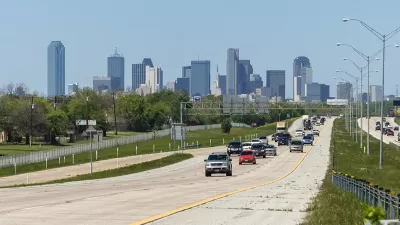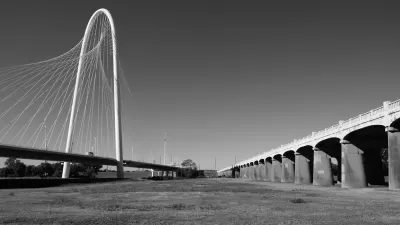Mark Lamster has eviscerated the city of Dallas for its plans to build the Trinity Toll Road before—and he'll probably do it again.
Mark Lamster, architecture critic for The Dallas Morning News, describes his befuddlement with the latest developments in the saga of the Trinity River project:
Only in Dallas would you design a highway in a park, and only in Dallas would you design a highway in a park before designing the park itself. Or even developing a general concept of that park, much less creating an authority that might actually be charged with building and paying for it.
That planning context explains, according to Lamster, why the project "has been meandering along for the better part of two decades with no tangible result beyond an endless series of conflicting reports, studies, and briefing documents."
Lamster casts doubt on the idea that the "Dream Team" that released its report for the Trinity Toll Road earlier this week cleared any of the hurdles that have plagued the project during its history. Moreover, writes Lamster, "[t]here is a good argument that the dream team should never have been convened in the first place, that it was conceived and paid for by toll-road proponents to give intellectual cover for the plan to drive a high-capacity toll road through the Trinity…"
The remainder of the column details the back-and-froth between Dream Team members and city councilmembers during the recent public hearing on the report, and also illustrates how the project exemplifies "Dallas Logic," as Lamster describes it. "Dallas Logic" resembles the "Paradox City" formulation Lamster created in 2014 in reaction to an earlier moment in the debate surrounding the Trinity Toll Road and Trinity River project.
FULL STORY: ‘Dallas Logic.’ Or, why the Trinity Project is forever stalled

Alabama: Trump Terminates Settlements for Black Communities Harmed By Raw Sewage
Trump deemed the landmark civil rights agreement “illegal DEI and environmental justice policy.”

Study: Maui’s Plan to Convert Vacation Rentals to Long-Term Housing Could Cause Nearly $1 Billion Economic Loss
The plan would reduce visitor accommodation by 25% resulting in 1,900 jobs lost.

Planetizen Federal Action Tracker
A weekly monitor of how Trump’s orders and actions are impacting planners and planning in America.

Waymo Gets Permission to Map SF’s Market Street
If allowed to operate on the traffic-restricted street, Waymo’s autonomous taxis would have a leg up over ride-hailing competitors — and counter the city’s efforts to grow bike and pedestrian on the thoroughfare.

Parklet Symposium Highlights the Success of Shared Spaces
Parklets got a boost during the Covid-19 pandemic, when the concept was translated to outdoor dining programs that offered restaurants a lifeline during the shutdown.

Federal Homelessness Agency Places Entire Staff on Leave
The U.S. Interagency Council on Homelessness is the only federal agency dedicated to preventing and ending homelessness.
Urban Design for Planners 1: Software Tools
This six-course series explores essential urban design concepts using open source software and equips planners with the tools they need to participate fully in the urban design process.
Planning for Universal Design
Learn the tools for implementing Universal Design in planning regulations.
Caltrans
Smith Gee Studio
Institute for Housing and Urban Development Studies (IHS)
City of Grandview
Harvard GSD Executive Education
Toledo-Lucas County Plan Commissions
Salt Lake City
NYU Wagner Graduate School of Public Service




























